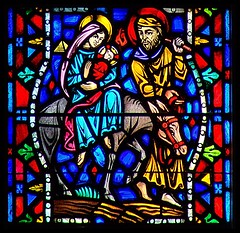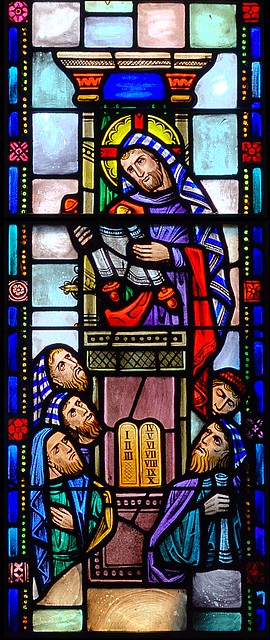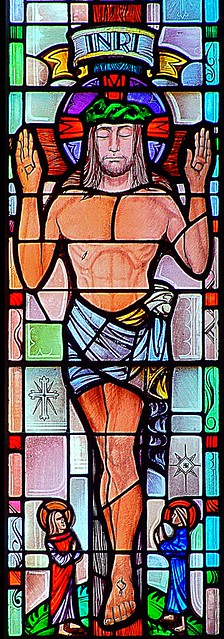 |
| King Herod wanted to kill Jesus as soon as he was born. The holy family fled to Egypt because Christ’s time had not yet come. |
(Isaiah 9:6-7a)
The prophesy given to Isaiah (above) was fulfilled when Jesus was born in Bethlehem hundreds of years later. In the evening after Jesus was born, an angel announced the birth to shepherds in the rural Bethlehem area, and he was joined with a multitude of the heavenly host praising God and saying, “Glory to God in the highest, and on earth peace among those with whom He is pleased.” (Luke 2:14)
 |
| When Jesus raised Lazarus from the dead the Pharisees plotted to kill Lazarus with Jesus instead of rejoicing that God had done this marvelous good deed. |
Although the Holy Spirit directed Joseph to take Mary and Jesus to Egypt, this was a foreshadowing of what was to come for Jesus in His life, though God would use that to accomplish our salvation. Jesus later taught, “Do not think that I have come to bring peace to the earth. I have not come to bring peace, but a sword. For I have come to set a man against his father, and a daughter against her mother, and a daughter-in-law against her mother-in-law. And a person’s enemies will be those of his own household” (Matthew 10:34-36) Jesus was not advocating violence. Jesus always lived at peace with everyone, and taught His disciples to act peacefully also, even toward their enemies. What Jesus was talking about was that unbelievers live at enmity with believers, but they may be members of your own family.
Sinful people have wrong ideas of peace. We think that it is enough for peace that other people do what we want, and we can live in peace. The problem with that is that what I want is not necessarily beneficial for you (and vice versa). Sinners also think that peace comes from not telling others that their behavior is wrong and self-destructive. The world’s view of peace is, “Don’t tell me of my sins, and I won’t tell you of yours.” This may work with unbelievers for a while (until their favored sin adversely affects someone else), because unbelievers don’t love one another, but it ignores the fact that our sin is primarily actions against God, not our neighbor. Scripture says, “There is no peace for the wicked.” (Isaiah 57:21)
 |
| When Jesus proclaimed that He was the fulfillment of Isaiah’s prophesy the people wanted to throw Jesus off a cliff. |
Our problem is that it is our sin which destroys our peace with God. God rightly condemns our sin, saying, “The wages of sin is death,” (Romans 6:23) and “The soul who sins must die.” (Ezekiel 18:20) Once we are a sinner, we are under a death sentence and cannot do anything to save ourselves because we are guilty of sin. Our problem is that we inherit our sinful condition from our parents and so we are sinners from the very first moment of our conception. This is why there is no peace in our sinful world, and there never will be lasting peace.
This is why Jesus said He did not come to bring peace to the earth. For there to be peace on earth He would have had to do away with sinners, and He doesn’t want to do that, yet, because He loves us despite our sin, and He has a better solution that deals with our sin, while providing lasting peace between us and God the Father.
Christ’s solution was to become a man so that He could keep God’s Law perfectly and be the one obedient man in all of history who obeyed God in everything He did. Then Jesus offered His perfect life in payment and exchange for our sinful lives. The life of Jesus can redeem the whole world because, as the Son of God, Jesus is of the same “substance” as God the Father and God the Holy Spirit.
 |
| Jesus won reconciliation and peace between us and God through His suffering and death on the cross. |
This Christmas, and throughout the year, when you think of peace, know that true peace is peace with God through the forgiveness of your sins. Jesus is God, in the flesh, who became a man just so He could pay the price of our sins through His innocent suffering and death. This is why we Christians celebrate Christmas (and Good Friday). Through Jesus we have true peace with God. Even if the whole world turn against us we will have peace because Jesus has reconciled us with God the Father, and has made us His beloved children through the Holy Spirit’s miraculous work through Holy Baptism.
Christ give you His peace this Christmas season, and even forever.
Here are some quick links to some of my other Christmas articles:
Shepherd Visitors
The Incarnation of God
Does Jesus Sing?
God is With Us
Christ is For You
Is Christmas Offensive?
Here are some Bible passages which deal with peace (both positively, and negatively)
In peace I will both lie down and sleep; for you alone, O Lord, make me dwell in safety. - Psalm 4:8
Do not drag me off with the wicked, with the workers of evil, who speak peace with their neighbors while evil is in their hearts. - Psalm 28:3
In just a little while, the wicked will be no more; though you look carefully at his place, he will not be there. But the meek shall inherit the land and delight themselves in abundant peace. - Psalm 37:10-11
Steadfast love and faithfulness meet; righteousness and peace kiss each other. - Psalm 85:10
In my distress I called to the Lord, and he answered me. Deliver me, O Lord, from lying lips, from a deceitful tongue. What shall be given to you, and what more shall be done to you, you deceitful tongue? A warrior's sharp arrows, with glowing coals of the broom tree! Woe to me, that I sojourn in Meshech, that I dwell among the tents of Kedar! Too long have I had my dwelling among those who hate peace. I am for peace, but when I speak, they are for war! - Psalm 120
Blessed is the one who finds wisdom, and the one who gets understanding, for the gain from her is better than gain from silver and her profit better than gold. She is more precious than jewels, and nothing you desire can compare with her. Long life is in her right hand; in her left hand are riches and honor. Her ways are ways of pleasantness, and all her paths are peace. She is a tree of life to those who lay hold of her; those who hold her fast are called blessed. - Proverbs 3:13-18
“‘They have healed the wound of my people lightly, saying, “Peace, peace,” when there is no peace. Were they ashamed when they committed abomination? No, they were not at all ashamed; they did not know how to blush. Therefore they shall fall among those who fall; at the time that I punish them, they shall be overthrown,’ says the Lord.” Jeremiah 6:14-15
Deceit is in the heart of those who devise evil, but those who plan peace have joy. - Proverbs 12:20
When a man’s ways please the Lord, he makes even his enemies to be at peace with him. - Proverbs 16:7




 Click here to listen to the Issues Etc. Blog of the Week segment from May 28, 2010
Click here to listen to the Issues Etc. Blog of the Week segment from May 28, 2010